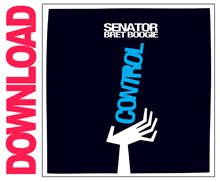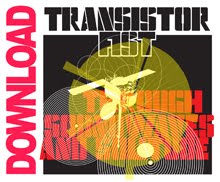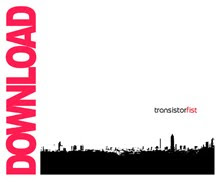Showing posts with label Transistor Fist. Show all posts
Showing posts with label Transistor Fist. Show all posts
Thursday, February 17, 2011
Friday, January 28, 2011
GET LIT: Can't Stop Won't Stop
 Can’t Stop Won’t Stop
Can’t Stop Won’t StopJeff Chang, 2005
Veteran rap writer Jeff Chang has crafted the definitive book about the hip-hop generation. This is the most intricate study about the rise of hip-hop and how it has altered public thought and practice. Chang’s overwhelming research of regional and international issues illustrates why South Bronx youngsters created the four elements that created a global phenomenon.
He traces the borough’s neglect back to poor urban planning, which drove away middle class whites and created minority housing. City planners wrought havoc on the Bronx, splitting it with roadways and leaving buildings to rot and burn. When you don’t have much, you make the most of what you have. You create.
Chang’s retelling of hip-hop’s infancy offers the book’s illest passages. Utilizing the memories of originators like Kool Herc, Bambaataa, Flash, Crazy Legs, Charlie Ahearn, Fab 5 Freddy and dozens others, he recreates the atmosphere on the page. After setting the scene by tracing ghetto creationism, he moves to Jamaican street music’s role in the sound system and record craft. He then delves into the New York gang traditions that spawned the tag and the up-rock, which morphed into a unified hip-hop style.
Chang’s omission of clothing styles, lingo and trends leaves room for discussion of the socio-political issues that revolve around the self-creation, and later exploitation, of the culture.
The light prose describing the park jams disappears as hip-hop gets discovered by Manhattan culture vultures, record executives and the mainstream media. Chang’s writing becomes stoic and urgent when he gets to Ice T’s “Cop Killer” situation, Rodney King and the riots and 2 Live Crew’s bout with the First Amendment. His telling of rap’s entrance into the mainstream is nostalgic, but also revealing about black art in America. Chang proves this in his unbiased telling of breakdancing’s appearances in film and television, graffiti’s gallery trade explosion and the record label engineering of rap stars.
The book loses some steam in the end, as it focuses on contemporary youth activism. While interesting, he does not draw the proper comparisons between hip-hop and the motivation for America’s youth to be socially conscious. After all, a lot of kids are buying the records Kool Herc seems to hate. -Bret Duchen
Monday, December 20, 2010
Wednesday, December 8, 2010
Tuesday, July 6, 2010
GET LIT: Notes Of A Native Son

Notes Of A Native Son
James Baldwin, 1955
Noted black intellectual James Baldwin can always be trusted to bring the noise. If you can’t find this little hard-to-come-by gem, just grab any Baldwin book you come across. I’ve read a ton of his work and I’m rarely disappointed.
James Baldwin, 1955
Noted black intellectual James Baldwin can always be trusted to bring the noise. If you can’t find this little hard-to-come-by gem, just grab any Baldwin book you come across. I’ve read a ton of his work and I’m rarely disappointed.
“Notes Of A Native Son,” which references the famous Richard Wright book, is hardcore criticism of a world not eager to coexist with blackness. In 1940 Wright’s defiant novel “Native Son” brought the reality of growing up black in America to a shocked public. That book helped increase racial discourse, and society soon saw a greater representation of black America in film, music, art and literature.
The problems of stereotypes again arose without much criticism. This book, though, seeks to dismantle the new reality the mass media was offering to the American public. Black stories were presented, but were they accurate? Black faces were represented, but were they accurate? Baldwin starts with these basic questions then delves into the American subconscious with subsequent arguments.
In discussing the increased publication of ethnic protest novels, he writes, “They emerge for what they are: a mirror of our confusion, dishonesty, panic, trapped and immobilized in the sunlit prison of the American dream.”
With this statement he not only describes then-contemporary black life, but also the decomposing stability of white America. This prefaces the rise of the coming civil rights movement, and highly critical artistic endeavors by writers like LeRoi Jones (aka Amiri Baraka) and filmmakers like Melvin Van Peebles.
Baldwin’s style bears significance. He is highly educated and worldly, which gives his opinions a rhetorical leaning. In utilizing this heavy-handed style he is able to fake out the mid-century intellectual by sounding colorless. This allows him to make serious social criticisms while seeming very safe. It is transparent when reading today, but it still works.
The book discusses the white reverence for “Uncle Tom’s Cabin,” while destroying its mythology. It later condemns Hollywood’s mis-marketing of black films. The book chronicles Baldwin’s search for identity, a struggle that took him from the streets of Harlem across the globe. Baldwin’s writings travel through Atlanta’s racial divide and later to Paris to discover how blacks are treated outside America.
Baldwin’s theme refers to “Native Son,” but previous reading of that work is not necessary, but of course recommended.
-Bret Duchen
Thursday, July 1, 2010
GETTING THERE...

The new Senator Bret solo project, "CONTROL", is in its final stages. The GoodSon has been busy mixing (the most tedious and un-fun part of making a record). Stay tuned.
Labels:
Atlanta,
atlanta hip hop,
Control,
Goodson,
Hip-hop,
Senator Bret Boogie,
Transistor Fist
Tuesday, April 20, 2010
Remembering Nod Factor
In digging through my hard drive I stumbled upon a folder of old design work that I have not seen in years. Every job is engrained in my memory, but the following really stands out because it was for my homies DJ Fudge and DJ Sky at the begining of a new era in Atlanta's indy hip-hop scene. I can't even remember when exactly this was, but for many years our insular little scene only existed at Apache (Mic Club) and Lenny's (Second Sight) and both events were on Tuesday night! Other than random events at MJQ or the Cotton Club, those were the only places the scene found itself. And honestly, the only place for the DJs to get busy was at Lenny's. Fudge and Sky were always there and records and needles got demolished. A gang of turntablists (Creation, Damn, Dainja, Fari, Synthesis....) would tag team all night to a small, but dedicated group of hip-hop heads. As time went on and everyone got a little older the old basement hang-out feeling got stale and Fudge and Sky sought a new outlet where turntablism would be at the forefront, while co-mingling with art, conversation, food and drinks. They had an idea for a weekly event that would be continuous, cyclical, constantly moving (read: the flyer's arrow pointing left flipped 360 degrees as you'd flip the flyer over). So they put together Nod Factor at the 5 Spot in Little Five Points. They brought in painters to work live with the music, pushed food and drinks (not just the giant cheap PBRs at Lenny's) and culture. BBoys would stop by, but so would writers and artists. They'd always have guest DJs stop in. Just bring your records and get on. Sometimes there would be musicians playing along. I would bring a drum on occasssion and sit in. Fudge even had me DJ a time or two. They'd also have shows from time to time. I remember Transistor Fist playing at the first anniversary show with Psyche Origami and Dylan's first ATL incarnation, Intellect and Dirty Digits. We played with Methuzulah one night when he had just changed his name from Solace Morner to Mojo Swagger. Nod Factor lasted a few years. It was the height of Myspace and the beginning of a new mode of promotion. You could post about an event and people would really show up. Nod Factor was bigger than Fudge and Sky. A lot of people latched on to the energy and helped promote the Wednesday night event themselves. For the first time, I remember seeing new faces at a local event so it was good while it lasted. Plus it was free!


Labels:
Atlanta,
DJ Fudge,
DJ Sky,
Hip-hop,
Methuzulah,
Mic Club,
Nod Factor,
Second Sight,
The 5 Spot,
Transistor Fist
Subscribe to:
Posts (Atom)









